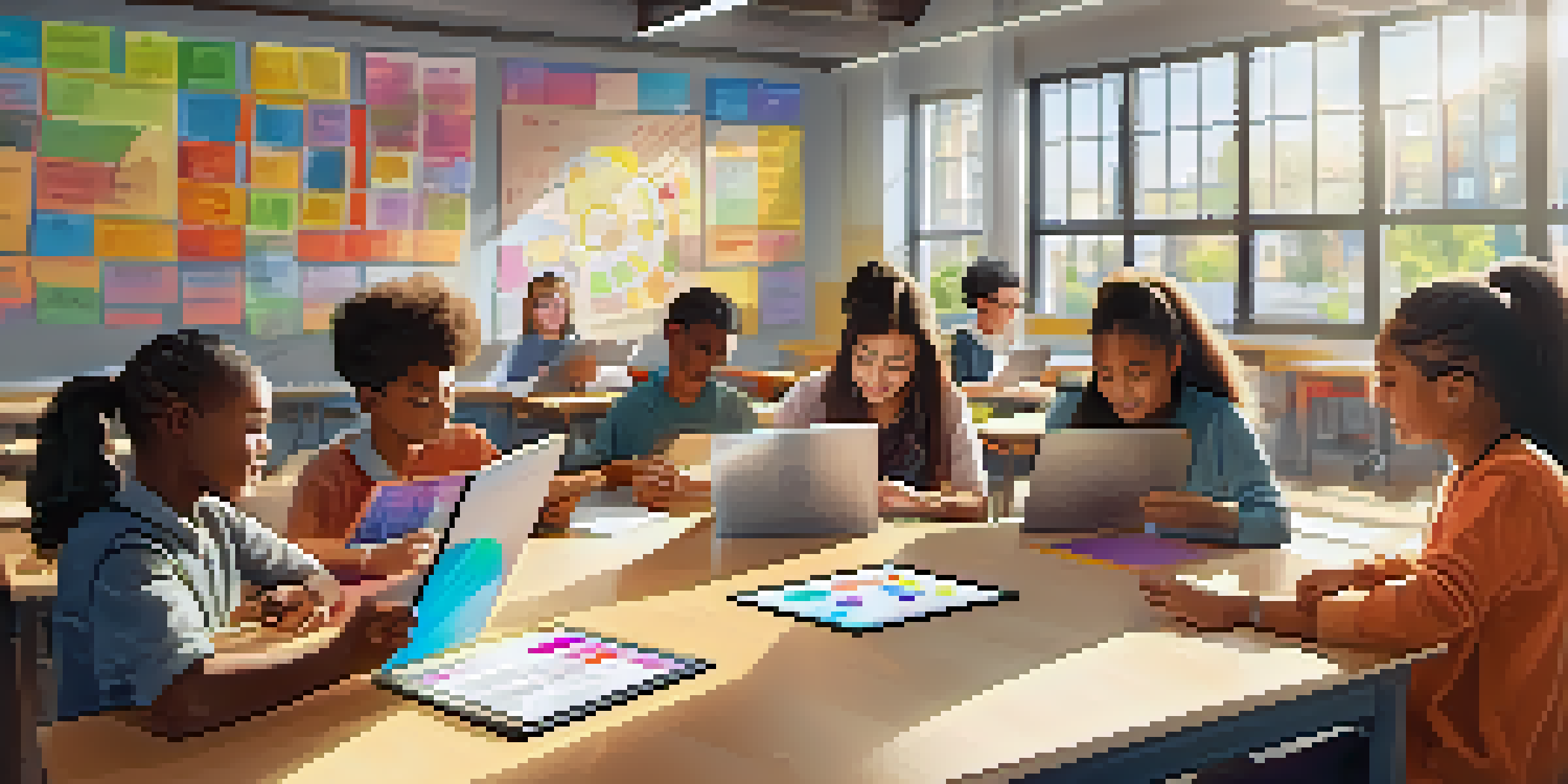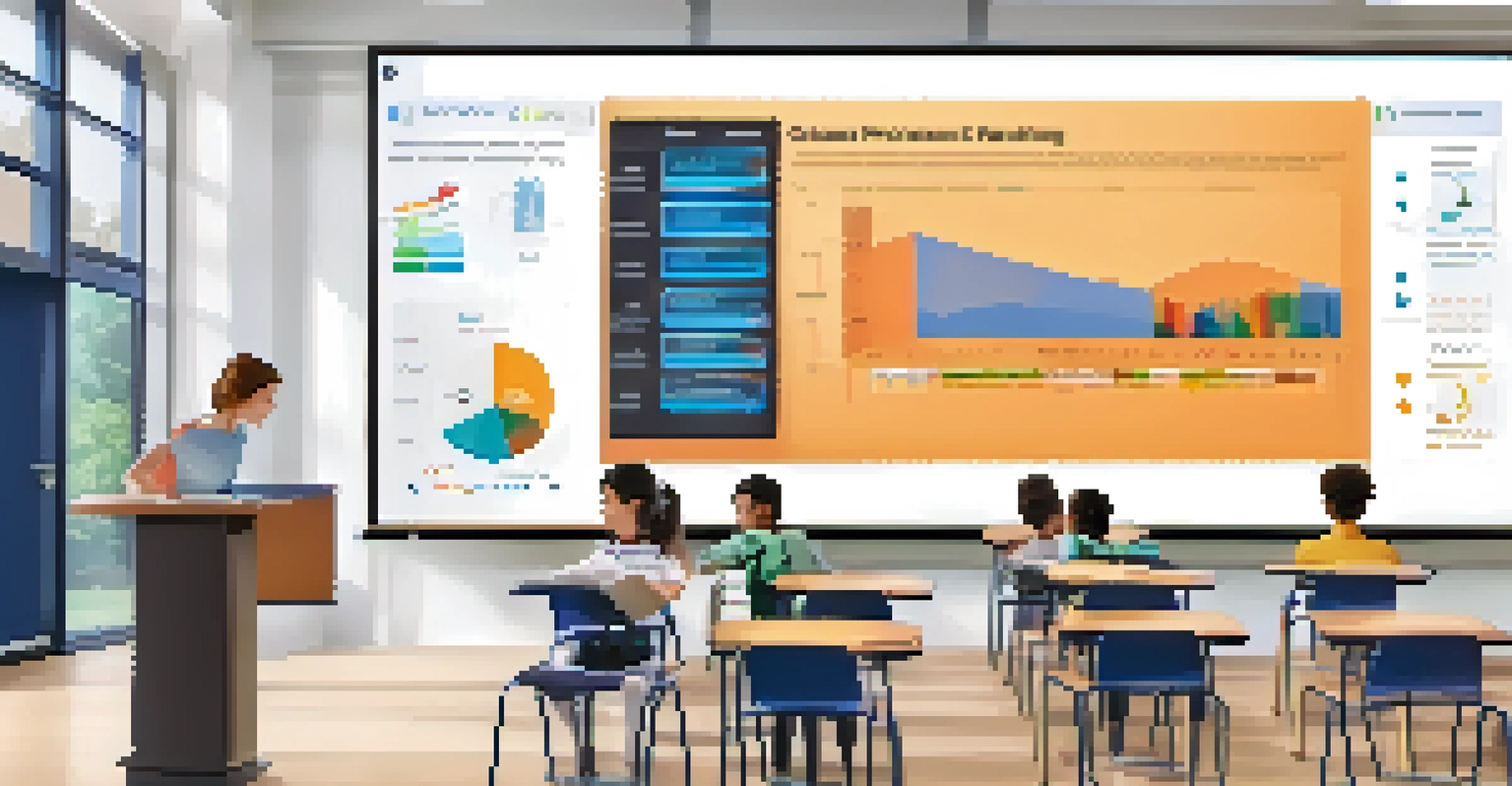AI-Driven Adaptive Learning Systems for Diverse Student Needs

Understanding Adaptive Learning Systems in Education
Adaptive learning systems are designed to tailor educational experiences to individual student needs. By using data and algorithms, these systems can analyze a student's progress and adapt content accordingly. This personalized approach aims to enhance learning outcomes and engagement, making education more effective for everyone.
Education is not the filling of a pail, but the lighting of a fire.
Imagine a classroom where each student receives a unique lesson plan based on their strengths and weaknesses. That's the beauty of adaptive learning—it recognizes that no two learners are alike. By adjusting the pace and complexity of materials, these systems ensure that every student can thrive.
Furthermore, adaptive learning systems can identify areas where a student struggles, allowing for targeted interventions. For instance, if a student excels in math but finds reading challenging, the system can provide additional resources to boost their reading skills, creating a more balanced educational experience.
The Role of AI in Enhancing Adaptive Learning
Artificial Intelligence (AI) is the backbone of adaptive learning systems, enabling them to process vast amounts of data quickly. Through machine learning algorithms, these systems can learn from student interactions and adjust content in real-time. This continuous learning cycle helps optimize the educational experience for each individual.

Think of AI as a personalized tutor that monitors a student's performance and preferences. The more a student interacts with the system, the better it understands their unique learning style. This allows AI to provide tailored recommendations and resources, ensuring that students remain engaged and motivated.
Personalized Learning for All
Adaptive learning systems customize educational experiences to meet individual student needs, enhancing engagement and learning outcomes.
Moreover, AI can predict future learning challenges based on historical data, allowing educators to proactively address potential issues. By identifying at-risk students early, schools can implement support measures that help keep everyone on track, fostering an inclusive learning environment.
Benefits of AI-Driven Adaptive Learning for Students
One of the primary benefits of AI-driven adaptive learning is increased student engagement. When lessons are personalized, students are more likely to be interested and invested in their education. This heightened engagement leads to better retention of information and improved academic performance.
The future of education is not about filling students with knowledge but equipping them with the skills to learn continuously.
Additionally, these systems promote self-paced learning, allowing students to progress at their own speed. For instance, students who grasp concepts quickly can move ahead, while those needing more time can revisit challenging material without feeling rushed. This flexibility accommodates diverse learning paces and styles.
Lastly, AI-driven adaptive learning fosters a growth mindset by encouraging students to take ownership of their learning journeys. As they receive instant feedback and see their progress, students gain confidence in their abilities, leading to a more positive attitude toward learning.
Challenges and Considerations in Implementation
While the benefits of AI-driven adaptive learning are clear, there are also challenges in implementing these systems effectively. One significant issue is the need for high-quality data; without accurate information about student performance, the system's adaptability may be compromised. Schools must invest in data management to ensure the best outcomes.
Another challenge is the potential for technological barriers. Not all students have equal access to the necessary devices and internet connectivity, which can lead to disparities in learning opportunities. It's vital for educational institutions to address these gaps to ensure that all students can benefit from adaptive learning.
AI Enhances Learning Adaptability
Artificial Intelligence drives adaptive learning by processing data in real-time, allowing for personalized recommendations and proactive support for students.
Finally, there's the question of teacher training. Educators need to be equipped with the skills to interpret data and integrate adaptive learning into their teaching strategies. Ongoing professional development is essential to maximize the effectiveness of these systems and ensure that they complement traditional teaching methods.
How Adaptive Learning Supports Diverse Learners
Adaptive learning systems are particularly beneficial for diverse learners, including students with varying abilities and backgrounds. By customizing content to fit individual needs, these systems can cater to students who may struggle in a traditional classroom setting. This inclusivity helps ensure that no student is left behind.
For example, English language learners can receive additional support tailored to their language acquisition needs. The system might offer vocabulary-building exercises or culturally relevant content that resonates with their experiences. This approach not only aids comprehension but also fosters a sense of belonging.
Moreover, students with learning disabilities can benefit from adaptive learning by receiving tailored resources that accommodate their specific challenges. The flexibility of these systems allows for modifications that support diverse learning styles, making education more equitable for everyone.
The Future of Adaptive Learning Systems in Education
The future of adaptive learning systems looks promising, with advancements in AI and data analytics set to enhance educational experiences further. As technology continues to evolve, we can expect these systems to become even more intuitive and responsive to student needs. This evolution will likely lead to more effective learning outcomes overall.
Additionally, as schools increasingly recognize the importance of personalized education, we may see broader adoption of adaptive learning systems across various educational settings. From K-12 institutions to higher education, the potential for these systems to transform learning is significant.
Challenges in Implementation
Despite their benefits, effective implementation of adaptive learning systems faces challenges such as data quality, access disparities, and the need for teacher training.
Ultimately, the integration of AI-driven adaptive learning systems could redefine the educational landscape, making learning more accessible and enjoyable for all students. By prioritizing individual needs, we can create a future where every learner has the opportunity to succeed.
Conclusion: Embracing Innovation in Education
In conclusion, AI-driven adaptive learning systems hold the key to addressing the diverse needs of students in today's classrooms. By leveraging technology, educators can create personalized learning experiences that foster engagement and success. This innovative approach not only benefits students but also empowers teachers to be more effective in their roles.
As we embrace these advancements, it's crucial to remain mindful of the challenges that come with them. By addressing issues related to data quality, access, and teacher training, we can ensure that adaptive learning systems serve all students equitably.

In a world where education is constantly evolving, adaptive learning represents a significant step forward. By prioritizing personalized learning, we can create an inclusive environment that encourages every student to reach their full potential.